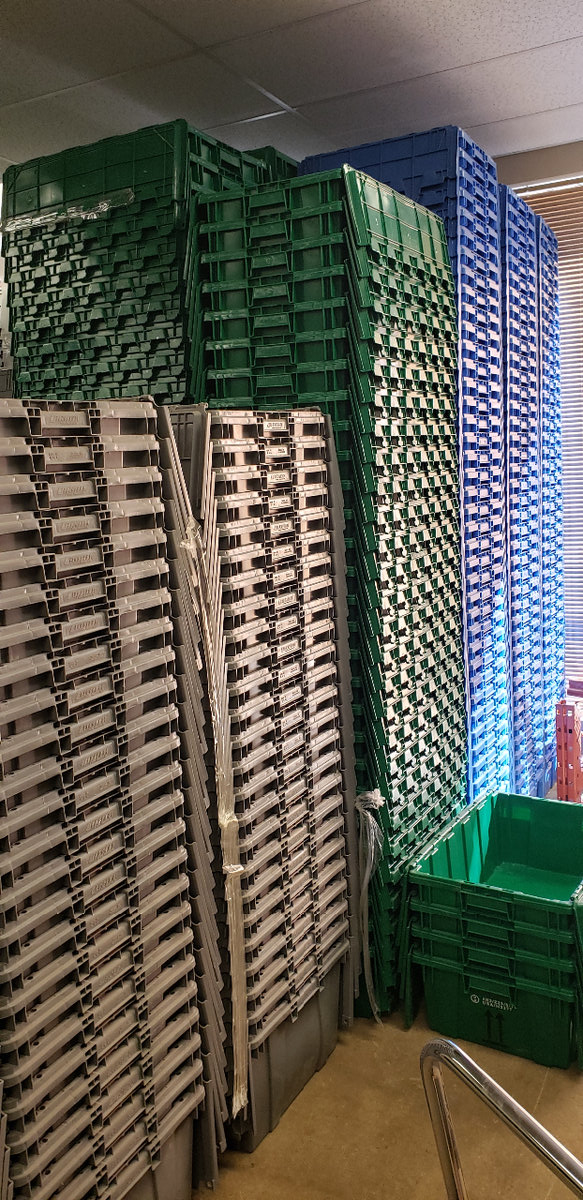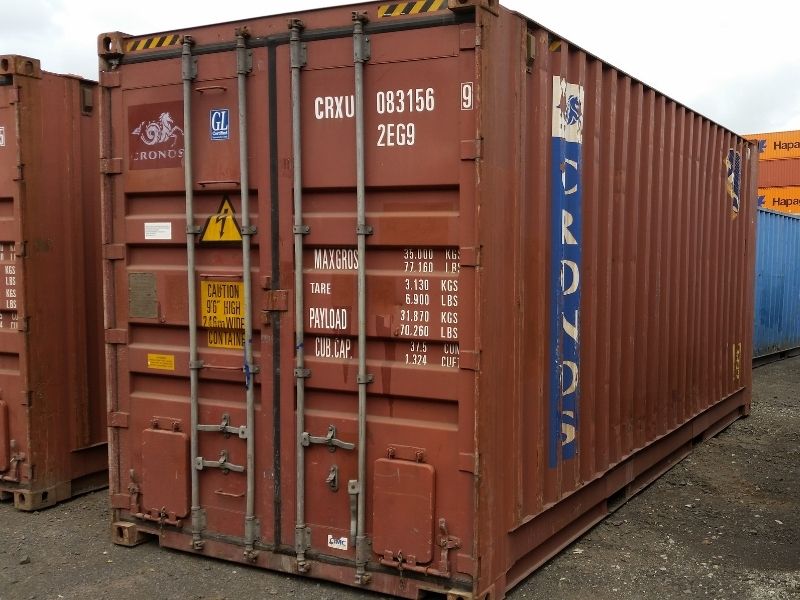The Ultimate Overview to Picking the Right Mass Containers for Your Organization Demands
Choosing the appropriate mass containers is essential for any type of organization that counts on effective logistics. Different types of containers exist, each designed for details products and applications. Aspects such as dimension, product compatibility, and regulative criteria play a considerable function in this decision-making procedure. Recognizing these components can result in improved functional effectiveness. Several services overlook essential aspects that could enhance their overall effectiveness and sustainability. What are these factors to consider?
Comprehending Various Kinds of Bulk Containers
Bulk containers act as necessary tools for organizations looking for reliable storage space and transport services. These containers come in various kinds, each made to satisfy particular operational demands. One usual type is the intermediate bulk container (IBC), which is excellent for fluid and granulated products, using an equilibrium of capacity and ability to move. One more prominent option is the mass bag, or FIBC, suitable for completely dry, flowable products. These adaptable containers are light-weight and can be conveniently transported and saved. For much heavier materials, inflexible mass containers are frequently used, supplying resilience and stability for risk-free handling. Additionally, there are customized containers tailored for unsafe products, ensuring compliance with safety and security guidelines. Recognizing the distinctive features of these bulk container kinds enables organizations to make informed decisions that maximize logistics and decrease expenses. By selecting the appropriate container, business can boost their functional effectiveness and simplify their supply chain processes.
Key Material Considerations for Mass Containers
When selecting bulk containers, it is necessary to ponder the products made use of in their building. Variables such as longevity, toughness, and chemical compatibility play an essential function in making sure the containers fulfill details functional needs. In addition, weight and transportability problems can affect both effectiveness and transportation logistics.
Material Sturdiness and Strength
Sturdiness and strength are vital consider choosing materials for mass containers, as they directly affect the container's ability to endure various ecological conditions and taking care of processes. Products such as high-density polyethylene (HDPE), polypropylene, and stainless-steel are commonly preferred for their robust homes, offering resistance to impact, temperature level, and abrasion variations. The selection of material additionally affects the general lifespan of the container; stronger products generally result in less regular replacements, causing set you back savings gradually. In addition, the weight of the product can influence shipping costs and convenience of handling. Companies should consider their specific functional atmospheres and the possibility for deterioration to ensure peak durability and strength in their mass container option.
Chemical Compatibility Factors
Comprehending chemical compatibility is necessary for choosing mass containers, as the materials used should withstand the details compounds they will hold. Numerous factors influence compatibility, consisting of the chemical nature of the contents, temperature level, and period of storage space. Corrosive chemicals may call for containers made from stainless steel or specialized plastics that stand up to destruction. In addition, reactive substances can create warm or gases, necessitating aired vent or pressure-rated containers. The option of container product, whether polyethylene, steel, or polycarbonate, ought to line up with the chemical homes of the saved materials to avoid breaches or leakages. Eventually, a comprehensive assessment of these compatibility aspects ensures secure handling and storage, safeguarding both employees and the atmosphere while preserving product integrity.
Weight and Transportability Issues
Picking bulk containers entails not only evaluating chemical compatibility however also taking into consideration weight and transportability. Organizations should assess the convenience of handling and transport to optimize efficiency. Lightweight products like high-density polyethylene (HDPE) or light weight aluminum can facilitate much easier activity and reduce delivery costs. Conversely, much heavier containers might supply improved longevity however can prevent flexibility, especially in atmospheres requiring constant moving. Additionally, the style of the container ought to permit practical training and piling, making certain ergonomic safety for employees. Business must likewise take into consideration the infrastructure offered for transportation; as an example, containers compatible with forklifts or pallet jacks can enhance procedures. Eventually, the ideal equilibrium in between weight and mobility straight influences functional performance and expense performance.
Sizing Your Mass Containers for Ideal Effectiveness
When sizing mass containers, companies have to thoroughly analyze the dimensions needed to fit their particular items. he said In addition, weight capability is a crucial factor that affects performance and security throughout transport and storage space. Efficient sizing not only takes full advantage of space but additionally enhances operational workflows.
Identifying Container Capacities
Choosing the ideal dimensions for mass containers is essential for making best use of performance in storage space and transportation. Services need to assess their certain requirements, considering aspects such as available area, the nature of the goods being saved, and the methods of transport used. Exact dimensions assure that containers fit preferably in vehicles and storehouses, lessening squandered room and reducing handling time. Requirement dimensions can provide convenience, however custom measurements might be essential for distinct requirements or to accommodate specific items. Additionally, it is necessary to examine piling capacities and access, as these aspects influence general functional performance. Inevitably, the appropriate dimensions cause improved company and structured logistics, benefiting the total performance of the service.
Weight Ability Considerations
Understanding weight capability is vital for businesses aiming to enhance their mass container efficiency. The weight ability of a container straight impacts storage space abilities, transportation logistics, and overall functional costs. Choosing containers with the appropriate weight limitations assures that services can safely store and transfer their goods without taking the chance of damage or compliance issues. Overwhelming containers can bring about architectural failings, while underutilizing capacity cause thrown away resources. When choosing containers, it is important for companies to examine their item weights and take into consideration any kind of regulative demands. Additionally, elements such as the kind of material, intended use, and environmental problems must likewise affect weight ability choices. By reviewing these components, organizations can improve efficiency and ensure a structured supply chain.
Regulative Conformity and Security Standards

Regulatory conformity and safety standards play an important role in the option of mass containers for services. Organizations must ensure that their containers meet numerous guidelines set by local, nationwide, and international authorities. These standards commonly refer to product safety, architectural integrity, and appropriate labeling, which help prevent mishaps and assure the safe transport of products.
Furthermore, adherence to industry-specific guidelines, such as those from the Food and Drug Administration (FDA) or the Occupational Safety And Security and Health Management (OSHA), is essential for companies dealing with harmful materials or foodstuff. Non-compliance can cause penalties, legal concerns, or damage to an organization's track record.
Organizations need to likewise take into consideration the container's compatibility with the products being kept or transported to prevent contamination or chemical reactions (used bulk containers). To summarize, comprehending and carrying out governing compliance and security criteria is essential for the accountable and efficient usage of mass containers
Sustainability Alternatives for Eco-Friendly Bulk Containers

Companies are likewise exploring options made from recycled materials, which not just preserve resources however additionally sustain the recycling sector. In addition, developments in design allow for lighter containers that call for much less energy to transport, better boosting sustainability. By integrating these green mass container choices, services can show their commitment to environmental stewardship while meeting consumer need for sustainable methods. This shift not only aids the world but can likewise enhance brand credibility and customer commitment.
Cost-Effectiveness and Budgeting for Bulk Containers
While many companies concentrate on sustainability, cost-effectiveness remains a vital element when choosing bulk containers. Organizations should analyze the initial purchase price, as well as long-term operational prices, to ensure economic viability. Variables such as sturdiness, upkeep, and reusability play a substantial role in establishing overall costs.
Buying top notch containers might produce greater ahead of time expenses yet can result in financial savings via lowered substitute prices and decreased waste. In addition, organizations must consider transport prices and storage efficiency, as these can impact the overall spending plan.

Regularly Asked Concerns
How Do I Determine the Right Container for Hazardous Products?
To identify the best container for harmful materials, one must evaluate compatibility with the compound, consider the container's material, check for regulatory conformity, and examine capacity and safety features to assure proper handling and storage space.
Can Bulk Containers Be Custom-made for Certain Products?
Yes, bulk containers can be customized for particular items. refurbished bulk containers. Numerous features, such as material, size, and style, can be customized to satisfy distinct demands, guaranteeing excellent security and effectiveness for carrying and saving various goods
What Is the Ordinary Life Expectancy of Various Mass Container Types?
The average life expectancy of mass container types differs; plastic containers last 5-10 years, metal containers 10-20 years, and wooden containers usually last 3-7 years, depending on use, upkeep, and environmental problems.
How Should I Tidy and Maintain Mass Containers?
To cleanse and keep bulk containers, one ought to on a regular basis evaluate for damages, get rid of deposit, wash with proper detergents, rinse completely, and warranty proper drying before storage. Following manufacturer standards improves longevity and safety and security during use.
Exist Rental Alternatives for Bulk Containers Available?
Yes, various companies read here supply rental alternatives for bulk containers, providing adaptability for businesses. These services can suit numerous demands, permitting firms to manage inventory efficiently without the commitment of acquiring containers outright.
Toughness and strength are vital aspects in choosing materials for mass containers, as they straight influence the container's capability to withstand different environmental problems and handling processes. Understanding chemical compatibility is important for picking mass containers, as the products made use of need to resist the particular materials they will certainly hold. Recognizing weight ability is crucial for organizations intending to maximize their mass container effectiveness. Governing conformity and safety criteria play an important role in the choice of bulk containers for organizations. While many businesses concentrate on sustainability, cost-effectiveness continues to be a vital variable when picking mass containers.